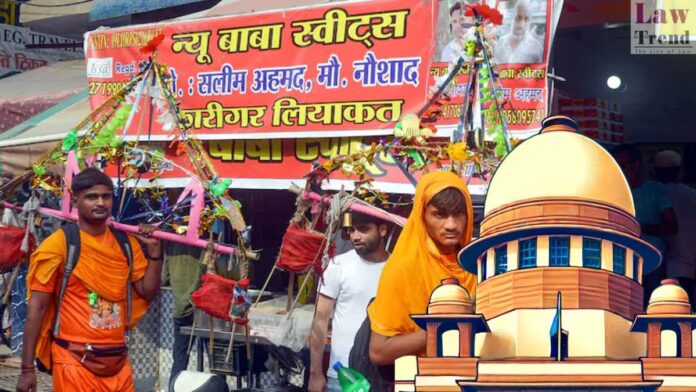The Supreme Court on Tuesday refused to stay the Uttar Pradesh government’s directive mandating the display of QR codes at eateries along the Kanwar Yatra route, while directing all hotels and dhabas to comply with statutory norms by displaying their licences and registration certificates.
A bench comprising Justices M.M. Sundresh and N. Kotiswar Singh clarified that, as Tuesday marked the last day of the annual Kanwar Yatra, it would not delve into wider constitutional issues around the QR code policy and the naming of owners.
“We are told that today is the last day of the yatra… Therefore, at this stage we would only pass an order that all the respective hotel owners shall comply with the mandate of displaying the licence and the registration certificate as per the statutory requirements,” the court said.
The top court was hearing a petition filed by academician Apoorvanand Jha and others, challenging the QR code directive, which they alleged enables profiling and discrimination against minorities. Senior advocate Abhishek Manu Singhvi, representing the petitioners, argued that the Uttar Pradesh government should have sought a modification of the court’s earlier 2024 order before issuing the new QR mandate.
Singhvi contended that the policy was “the most divisive initiative possible,” accusing the state of trying to ostracise minority vendors by revealing religious identities through QR codes. “Will my surname ensure that kanwariyas receive good quality food, not a menu card?” he asked, alleging the directive could fuel social exclusion.
Referring to recent reports of alleged attacks on shops during the yatra, Singhvi said, “When you sow the seeds of divisiveness, the rest is taken care of by the populace.”
In response, Justice Sundresh said that pilgrims have the right to choose food based on their preferences, especially on religious occasions. “If one hotel was earlier serving non-vegetarian, and for the purpose of better business they serve only vegetarian during the yatra, it will be an issue for the consideration of the consumer. Consumer is the king,” he remarked.
Senior advocate Mukul Rohatgi, representing the Uttar Pradesh government, defended the move, stating it aligned with the Food Safety and Standards Authority of India (FSSAI) regulations. “There are people in this country who will not eat in their brother’s house if meat is cooked. There are sentiments of devotees,” Rohatgi said, dismissing concerns over displaying identity.
He questioned the reluctance to show names, saying, “Why are you scared of showing your name? I don’t understand.”
Senior advocate Huzefa Ahmadi, also appearing for the petitioners, pointed out that eateries along the Kanwar route already serve only vegetarian food during this period due to local rules, suggesting the QR mandate was unnecessary.
Petitioner Jha had earlier flagged a June 25 press release by the UP government that mandated QR codes at all eateries, arguing that it amounted to indirect enforcement of caste and religious profiling, which had already been stayed by the Supreme Court last year.
He further argued that requiring religious and caste disclosure under the guise of licence rules breached owners’ right to privacy.
The court, however, declined to entertain the petition further, declaring the issue “infructuous” as the yatra was ending. Last year, the Supreme Court had stayed similar directives issued by UP, Uttarakhand, and Madhya Pradesh, citing concerns about discriminatory practices.




